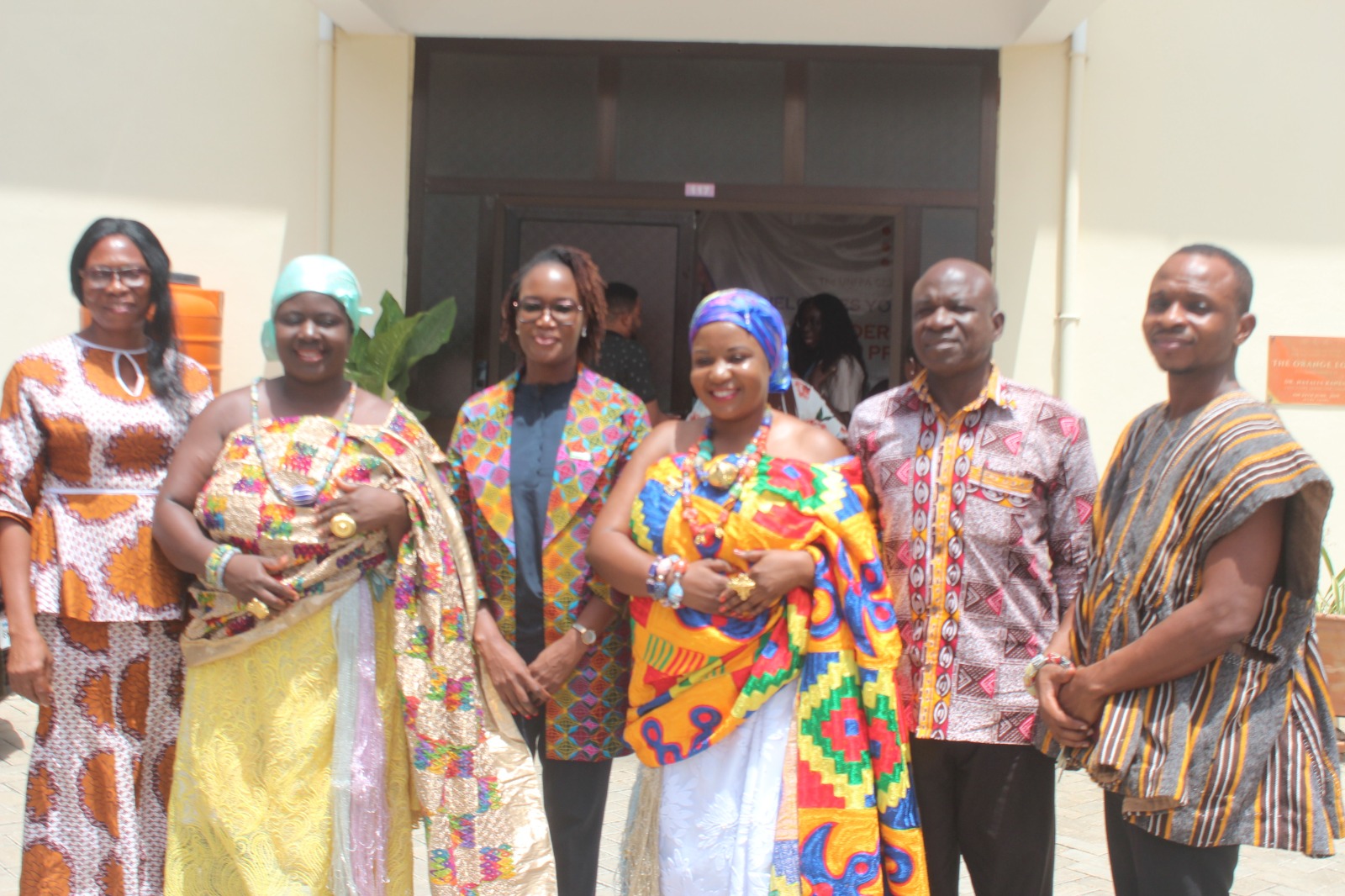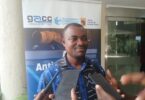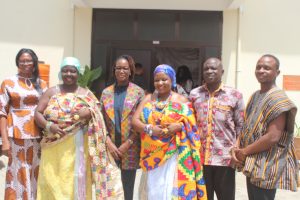
UNFPA Country Deputy Representative, Dr. Emily Naphambo in a group picture with Mamaga Akua Sabea Nyabor VII and her entourage
Story by: Ishmael Barfi
The rapid adoption of digital technologies to tackle developmental needs by women according to the United Nations Population Fund (UNFPA) Country Deputy Representative, Dr. Emily Naphambo in Ghana is commendable and inspiring.
To her, it has enabled people, especially women to have numerous access to platforms and information to improve and enhance their well-being and development.
Such efforts she emphasized are part of the holistic agenda of achieving a gender-equal world, therefore closing the digital gaps and hence providing and enhancing life opportunities.
The UNFPA Deputy Country Representative, Dr. Emmily Naphambo made these remarks during a mentorship session for girls, dubbed “SHECAN”, at the UNFPA Orange Loft in Accra on Wednesday, 5th April 2023.
With Africa’s Internet economy estimated to reach $180 billion by 2025, according to the IFC, e-commerce can drive inclusive growth and create three million jobs across Africa by 2025 if technology and online markets are well utilized.
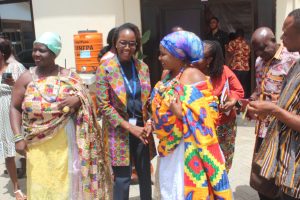
UNFPA Country Deputy Representative, Dr. Emily Naphambo interacting with Mamaga Akua Sabea Nyabor VII
Adding her voice, the Head of the Gender Unit, Dr. Doris Mawuse Aglobitse, recounted how e-commerce, the act of buying and selling goods electronically online became the norm of the day during the COVID-19 pandemic outbreak.
Revealing that, though the pandemic is on the low, the use of digital platforms is highly used and patronized.
She further referred to the UNDP’s COVID-19 Business Tracker report which indicated that the use of digital technology (mobile money and internet) among businesses, following the pandemic, has increased and risen even further among women.
In efforts to close the digital gap, especially among women, girls, and youth, the Head of the Gender Unit explained that the rapid increase of digital technologies could be more beneficial to Ghana.
However, she was quick to add that, per figures available, women are at high risk of being left behind without the proper and needed support and training.
To that effect, the United Nations (UN) she explained is working with other stakeholders to address the economic performance of MSMEs in the country.
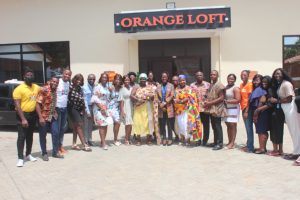
Group picture of fellows and dignitaries
In the area of Agribusiness, she indicated that the UN has launched the “Expanding the Kaizen initiative by enhancing sustainable agribusiness” project.
This she acknowledged is aimed at providing avenues for businesses to use UNIDO’s digital dashboard system to enhance resource efficiency, environmental sustainability, and the social welfare of these MSMEs.
According to her, “It looks to further enhance the competitiveness of MSMEs in the country while UNCTAD’s work with the Ministry of Trade and Industry on e-commerce is critical in accelerating digital trade, especially for women”.
She also revealed that UN-Habitat and UNHCR in Ghana have launched the “Digital and Reproductive Health Learning for Girls and Boys in Informal Settlements” program through a partnership with IamtheCODE Foundation.
This partnership she pointed out is aimed at improving digital and reproductive health education in selected slums and informal settlements in Ghana.
Furthermore, the Ghana Health Service (GHS) and other partners with support from UNFPA have developed the WAWABA SRH, a user-centered web-based Sexual Reproductive Health (SRH) platform that directs users to the nearest locations to access friendly SRH services.
Adding that, it is an integral part of the You-Must-Know (YMK) App of the GHS which over 50,000 adolescents have had access to it.
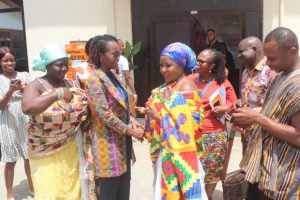
UNFPA Country Deputy Representative, Dr. Emily Naphambo interacting with Mamaga Akua Sabea Nyabor VII
Sharing her experiences and benefits of digital platforms, the paramount Queen mother of the Akrofu Traditional area, Mamaga Akua Sabea Nyabor VII, explained that, she has and continues to generate income digitally for women especially farmers and food vendors through her online marketplace dubbed “Asigame” on Facebook and Instagram.
Emphasizing that digital marketing hence e-commerce is easy to access, less stressful, and comes with numerous benefits when well-planned and developed.
As a result of digital marketing, and e-commerce, she revealed that she had to close down her physical space shop due to the high cost of the rent.
“For now, I operate my e-business -internet marketing where I take my payment through electronic funds transfer; mobile money which makes life much easier and comfortable for me”, she said.
According to her, the outlined number of female-initiated/female-owned technology-based innovations indicates that women are churning out usable and inclusive digital tools which is encouraging.
Mamaga Akua Sabea Nyabor VII who is also an immigration officer expressed the hope that the UN will continue to explore the impact of the digital gender gap on widening economic and social inequalities while providing an opportunity to spotlight the importance of protecting the rights of women and girls in digital spaces.
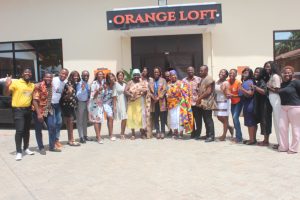
Women’s Rapid adoption of digital technologies in Ghana is encouraging-UNFPA
In conclusion, she urged young people especially young women to use the time spent on social platforms like Facebook, Instagram, etc to profit themselves.
“That space on social media, that Facebook, that Instagram page you have, use it to bring benefits to yourself, you can sell there. You can be an ambassador to a product today”, she reiterated.
Currently, ‘Asigame’ on Facebook has about 26,000 members who deal in various foodstuffs and are widely patronized by the general public.
In attendance were the UNFPA Deputy Country Representative, the Representative from UNWOMEN, the Swiss Ambassador, and Mamaga Akua Sabea Nyabor VII, paramount Queen mother of the Akrofu Traditional area, former Director of Social Welfare as well as the fellows of the UNFPA Fellowship program.
Source: www.thenewindependentonline.com


